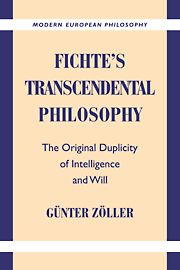Book contents
- Frontmatter
- Contents
- Acknowledgments
- Method of Citation for Fichte's and Kant's Works
- Key to Fichte's Works Cited
- Introduction
- Part I Thinking about Thinking
- Part II Knowing and Doing
- 3 Positing and Determining
- 4 Changing the Appearances
- Part III Thinking and Willing
- Part IV Pure Willing
- Notes
- Bibliography
- Index
4 - Changing the Appearances
Published online by Cambridge University Press: 05 June 2012
- Frontmatter
- Contents
- Acknowledgments
- Method of Citation for Fichte's and Kant's Works
- Key to Fichte's Works Cited
- Introduction
- Part I Thinking about Thinking
- Part II Knowing and Doing
- 3 Positing and Determining
- 4 Changing the Appearances
- Part III Thinking and Willing
- Part IV Pure Willing
- Notes
- Bibliography
- Index
Summary
When Goethe has Faust retranslate the opening verse of the prologue to the Gospel according to John with the words “In the beginning was the deed” (Im Anfang war die Tat), thus rendering “logos” in decidedly activist, practical terms, he could well have been referring to the latter-day example of his contemporary and acquaintance Fichte. For in Fichte philosophical speculation, and theory in general, is put into the service of practical concerns, and specifically of moral considerations, based on his conviction that reason itself is originally practical and that philosophical theory has to vindicate reason's practical nature by reconstructing the practical foundations of all knowledge in a comprehensive Wissenschaftslehre.
Yet whereas in Goethe's Faust the relation between life's origin in doing and the pallor of thinking is the matter of tragedy, in Fichte's case life and thought are brought into harmony in the existence of the scholar-teacher, who is active through lecturing and publishing and who thus acts vicariously, through his students. Still, there is a tragic note even to Fichte's scholarly existence. For the philosopher's influence on action is conditional upon the free cooperation and comprehension of his listeners and readers – and for the most part Fichte failed to secure that cooperation and comprehension. For much of his life Fichte, the preacher, orator and professor, who always regarded it as his vocation to act upon others and through others, was effectively without an audience.
- Type
- Chapter
- Information
- Fichte's Transcendental PhilosophyThe Original Duplicity of Intelligence and Will, pp. 55 - 68Publisher: Cambridge University PressPrint publication year: 1998

